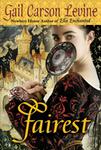
Why are creators of children’s and YA literature so obsessed with princesses and royalty and princesses? Have we learned nothing from the life of the late lamented Princess of Wales? Or the two most recent generations of royalty in Monaco? It seems that as more and more of the reality of royal life becomes common knowledge, we’re cranking out more and more royal fantasies for our kids.
Forgive me. I am an aging feminist. I also suspect that around 288 years ago one of my ancestors was running through the streets of Paris screaming, “Liberté! Egalité! Fraternité!” and “Power to the people!”
Anyway, last Friday I read the very readable Fairest by Gail Carson Levine. Levine gained fame with her first book Ella Enchanted, which was a play on Cinderella. In places Fairest is reworking Sleeping Beauty. Or perhaps I should say, Sleeping Nonbeauty.
Aza is an unattractive foundling who was abandoned in an inn and brought up by the innkeeper and his wife, who love her, as do their other children. All teenagers think they are unattractive, but evidently Aza is right. She is large and unpleasant looking enough that people either stare or look away. But in a culture that admires singing—it’s this kingdom’s highest art form and people break into song just as part of conversation—Aza has an unusually beautiful voice.
When an aristocratic lady’s traveling companion takes ill at the family inn and can’t accompany her to the king’s wedding, Aza is drafted into service. This gets her into the castle where she becomes the queen’s lady-in-waiting, meets the prince, gets involved in intrigue…you know where I’m going with this.
Though I found the singing contrived, I understand that Levine was using it to try to create a unique world. And the romance? As an older reader, I found the king and queen’s romance more interesting than the prince and Aza’s. Man, Levine could do an adult novel about those two.
Fairest is a message book, but the message doesn’t overburden the story. And the message goes beyond, “Hey, girls, beauty is only skin deep.” It raises the question of what people will do to be beautiful. And I think it also raises the question of whether or not love alters how we see people.
As princess books go, Fairest is better than fair.
No comments:
Post a Comment